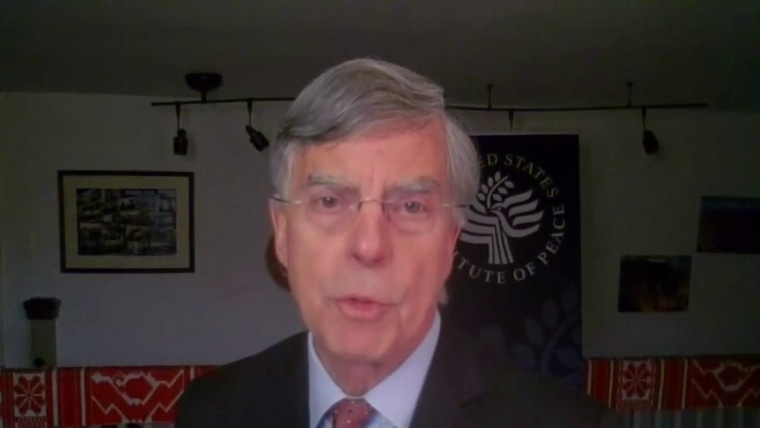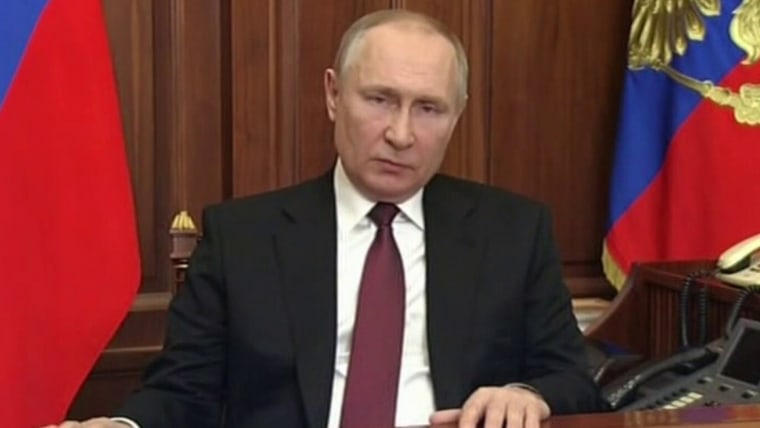At Wednesday night’s historic assembly of the United Nations Security Council, as the collected ambassadors concluded offering geared up speeches calling for de-escalation, Vasily Nebenzya, Russian ambassador to the U.N., confirmed Russian President Vladimir Putin’s announcement that the nation experienced started a “special armed forces operation” in Ukraine. In reaction, Ukraine’s ambassador overtly questioned Russia’s position as one of the most potent associates of the Protection Council.
Sergiy Kyslytsy, who’d prepared a statement arguing for diplomacy, ditched it to castigate the Russians for their unprovoked aggression — but only immediately after he’d read aloud the portion of the U.N. Constitution on admitting new customers and accused Russia of owning made use of a “sneaky” loophole to acquire the electrical power to veto Security Council motion.
It’s a daring claim — but one that is not as farfetched as it could appear to be. The Soviet Union died in December 1991, but there are various possible dates we could spot on the U.S.S.R.’s metaphorical loss of life certification. Whichever one particular is considered appropriate could alter the way international politics has functioned considering the fact that the end of the Chilly War.
The Soviet Union died in December 1991, but there are numerous doable dates we may possibly position on the U.S.S.R.’s metaphorical demise certification.
The U.N. was born as the extension of the Environment War II alliance headed by the United States, Soviet Union, France, China and the United Kingdom. People five associates received long lasting seats on the U.N. Security Council, which has the ability to pass resolutions that all member states need to stick to. They can also veto any enforcement action, like economic sanctions, the use of force and even expulsion from the U.N.
That previous position was of unique issue to Stalin throughout the conference of the Soviets, British and People at Yalta. The Soviet dictator was not sure about his country’s participation in the publish-war organization, remembering perfectly the way the U.S.S.R. had been booted from the League of Nations in 1940, as creator Stephen Schlesinger recounted in his e book “Act of Generation.” The veto power would avert this kind of a detail from taking place, British International Secretary Anthony Eden assured him. Stalin was mollified, but he also insisted on finding three seats in the U.N. Typical Assembly, one each individual for the Soviet Union, Belarus and Ukraine. The Western powers agreed, ensuing in all a few counting as founding users of the U.N.
Quick-ahead to 1991. The Soviet Union, getting hardly averted a coup that August, was straining and on the verge of collapse. By December, the 3 Baltic countries under Soviet rule — Latvia, Lithuania and Estonia — had previously declared their independence, and Ukrainians had voted to do the identical. On Dec. 8, the leaders of Belarus, Ukraine and Russia signed the Belovezha Accords, which declared that “the U.S.S.R. as a subject matter of international regulation and a geopolitical reality no for a longer period exists.” The Commonwealth of Unbiased States would swap it, formed of states present on equivalent footing.
As this was occurring, there was mass speculation about what to do with the Soviet seat at the U.N. No person was guaranteed just who the ambassador sitting down powering the U.S.S.R.’s placard represented. The CIS isn’t a “state” and so could not be the Stability Council’s newest member. Russian President Boris Yeltsin instructed U.S. Secretary of Point out James Baker that Russia preferred to consider more than the seat at a conference on Dec. 15 — which astonished Baker, due to the fact Russia hadn’t declared independence, wanted recognition as a new state but also needed to consider in excess of substantially of the Soviet equipment.
Eight other former Soviet Republics joined the CIS on Dec. 17 by signing the Alma-Alta Protocols. Amid these paperwork was a choice that the Commonwealth would “support Russia’s continuance of the membership of the Union of Soviet Socialist Republics in the United Nations, which includes permanent membership of the Safety Council, and other intercontinental corporations.” All the other folks — besides for founding customers Ukraine and Belarus — would abide by the regular admissions course of action.
Neither the Safety Council nor Normal Assembly at any time voted to approve Russia’s membership.
Three days afterwards, the working day just before Mikhail Gorbechev resigned as the leading of the Soviet Union, Yeltsin despatched a letter to the U.N. Secretary Standard declaring that “the membership of the Union of Soviet Socialist Republics in the United Nations, such as the Security Council and all other organs and businesses of the United Nations procedure, is becoming ongoing by the Russian Federation (RSFSR) with the help of the countries of the Commonwealth of Impartial States.” He also insisted that the “Russian Federation maintains complete accountability for all the legal rights and obligations of the USSR underneath the Constitution of the United Nations.”
Ukraine now argues that with the Soviet Union entirely dissolved, Russia really should have had to reapply for admission to the U.N. like the relaxation of the previous Soviet republics. “For about 30 years, people today have been sitting down in the U.N. Protection Council with a indicator that reads ‘Russian Federation’ and pretending to be a authentic member,” Kyslytsy, the Ukrainian ambassador, informed The Kyiv Write-up this thirty day period. “Everyone all-around thinks this is regular.”
He has a issue: The successor states of the former Yugoslavia and Czechoslovakia had to reapply to sign up for the U.N. separately. Neither the Safety Council nor Common Assembly ever voted to approve Russia’s membership. Yeltsin himself referred to the seat as “vacant” just before Russia moved in. But neither did any nation formally item at the time, inspite of grumblings from lesser states that the long term members’ permanency made even less feeling than at any time.
Ukraine’s argument has supporters and detractors. Israeli regulation professor Yehuda Blum argued in 1992 that Russia’s assert to the Soviet seat did not sit proper with precedent. The U.N.’s Legal Committee had resolved in 1947 that “the rights and obligations of membership of a Point out stop to exist ‘with its extinction as a lawful human being internationally regarded as these types of.’” By declaring that the Soviet Union no lengthier existed at all on Dec. 8 and 17, it stood to cause that there was no extended a Soviet seat to occupy, Blum argued.
“This declare of the Russian Federation — built some 3 times (and possibly 16 days) just after the dissolution of the Soviet Union — that it was ‘continuing’ the legal existence and consequently the U.N. membership of the latter, have to therefore be thought of — irrespective of its evident political deserves — as becoming severely flawed from the lawful place of look at,” Blum wrote.
Alternatively, Estonian regulation professor Rein Mullerson in 1993 argued that Russia is lawfully a continuation of the Soviet Union, not a successor state. Subjective aspects, this sort of as territory, lifestyle and recognition by exterior events led him to conclude that the Soviet Union experienced been through a “separation of sections of its territory though its core — Russia — proceeds to exist as a continuation of the Union.” If that’s the situation, Russia’s claim of the Soviet Union’s seat will make full perception.
It is technically doable — just request China.
But let’s say Ukraine decides to shift forward with its argument and would like to in fact take out the Russian Federation from its Stability Council seat. It is technically achievable — just talk to China. Immediately after the Communist takeover in 1949, the deposed nationalist governing administration of the Republic of China hung onto the country’s Protection Council seat for decades.
As a lot more countries backing the People’s Republic in Beijing above the authorities in Taiwan joined the U.N., the U.S. utilised the body’s procedures to make certain that any vote to acknowledge the People’s Republic would call for two-thirds of the Common Assembly to pass. It took years, but in 1971, the Common Assembly passed Resolution 2758, which recognized the People’s Republic of China “as the only reputable associates of China to the United Nations.”
Ukraine might be on the path to having a very similar tack, rallying the Basic Assembly’s associates to both declare that Moscow just cannot possess the Soviet Union’s seat and wants to reapply or move the seat — and its veto power — on to an additional of the Soviet Union’s successors. But will it happen? It is unlikely such a momentous change in the worldwide purchase would transpire right away. And even if these kinds of a transform had been to arrive in the upcoming several times, China could even now veto any set of worldwide sanctions on Russia.
That mentioned, it’s a fascinating can of worms that Ukraine has opened. It will be tricky for Moscow to fully shut down the whispers that it does not belong on the Stability Council. Also, given how a great deal Russia cherishes that put at the desk, it’s not very likely they’ll be brief to forgive any region that attempts to acquire it from them.








More Stories
Twelve Signs of Sham Peer Review
Kate Wilhelm’s Death Qualified – Review of a Legal Thriller
Seven Legal Reasons to Trademark Your Brand